Aalto Networking Platform
Aalto Networking Platform -yhteistyöalusta tuo tutkimusosaamista yhteen yli laitosrajojen.
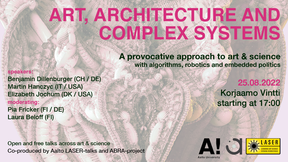
The world is getting increasingly complex as new developments, systems and even aesthetics are frequently introduced. While design and creative processes are evolving, new tools and methods, which are often adopted from science and technology, are taken into use in art, design and architecture—although strangely not vice-versa.
These diverse developments are as well impacting manufacturing, industries, urban habitats, design approaches and the arts in the expanded field. While early 80’ science-fiction movies showed us how incredibly dangerous the world could become if robots would become intelligent, the big overtake has not happened yet, but instead these technologies are deeply influencing the way we think, see, live and form our values. This leads us to the important questions that the invited speakers will aim to address from their own perspectives (architecture, design, biochemistry, robotics):
What is our future like, co-living with complex, robotic and automated systems? What kinds of politics do these developments present - who is included and excluded?
How are our aesthetics and thought processes impacted by the different approaches?
The talks will be by internationally high-level, innovative and unorthodox researchers:
Benjamin Dillenburger (CH/DE), Martin Hanczyc (IT/USA), Elizabeth Jochum (DK/USA) and Pia Fricker (FI/DE) (introduction).
Moderated by Pia Fricker and Laura Beloff.
The event is co-produced by Aalto LASER-talks and ABRA-project
https://www.aalto.fi/en/laser-talks https://www.abra-hub.net/
Presentations are followed by a discussion between the speakers and the audience can ask questions. We invite everyone who is interested to join, share projects, discuss issues, network, and collaborate together. LASER Talks are always free and open to the public. Please note that the event will be recorded.
Partners: Aalto University, Leonardo/The International Society for the Arts, Sciences and Technology (Leonardo/ISAST), and ABRA-Project.
Benjamin Dillenburger (CH/DE)
Lecture title: From bits and bricks - Towards a digital building culture
Bio: Architect Benjamin Dillenburger is Professor for Digital Building Technologies at the Institute of Technology In Architecture (ITA) at the Department of Architecture, ETH Zurich.
His research focuses on the development of building technologies based on the close interplay of computational design methods, digital fabrication and new materials. In this context, he searches for ways to exploit the potential of additive manufacturing for building construction.
He previously was appointed as Assistant Professor at the John H. Daniels Faculty of Architecture, Landscape and Design at the University of Toronto, and worked as a senior lecturer in the CAAD group at Swiss Federal Institute of Technology’s architecture department in Zurich. He holds a Master of Advanced Study degree from ETH Zurich and a Master of Architecture Degree from the Technical University Kaiserslautern.
Benjamin Dillenburger was shortlisted for the MoMA PS1 Young Architects Program. His work has been widely published and exhibited at the FRAC Archilab 2013 exhibition, the Art Basel / Design Miami, and the Design Exchange Museum in Toronto.
Martin Hanczyc (IT/USA)
Lecture title: Animation through Chemistry
Bio: Martin Hanczyc is an Associate Professor in the Department of Computational and Integrative Biology at the University of Trento, Italy and a Research Professor of Chemical and Biological Engineering at the University of New Mexico, Albuquerque USA. He formally was an Honorary Senior Lecturer at the Bartlett School of Architecture, University College London, Chief Chemist at ProtoLife and Associate Professor at the University of Southern Denmark. He received a bachelor’s degree in Biology from Pennsylvania State University, a doctorate in Genetics from Yale University and was a postdoctorate fellow under Jack Szostak at Harvard University. He has published in the area of droplets, complex systems, evolution and the origin of life. In 2014 Hanczyc established a laboratory for Artificial Biology as part of the Centre for Integrative Biology (CIBIO) at the University of Trento with a focus on integration of various functional aspects of artificial life, synthetic life, and natural life. His research projects are diverse and include: interfacial dynamics, modeling of complex chemistry, optimization strategies, robot-chemistry interfaces, fundamentals of intelligent materials, synthetic biology, and new materials for architecture and engineering.
Additionally, he is known for collaborating with artists and architects in innovative projects and also to develop public outreach. Hanczyc’s work has been highlighted in an invited TED talk, several keynote lectures and many press items including Nature, New Scientist, BBC, WIRED and Scientific American. He was included on the WIRED Smart List for 2013: http://www.wired.co.uk/magazine/archive/2013/12/features/the-smart-list-2013
Elizabeth Jochum (DK / USA)
Lecture title: Decolonizing the Machine: Confronting Axes of Inequality in Robots and Al
Bio: Dr. Jochum (she/her), is an Associate Professor in the Research Laboratory for Art and Technology at Aalborg University in Denmark. Her research combines robotics and art, and includes transdisciplinary collaborations in human-robot interaction, health, and engineering. From industrial robots to exoskeletons, she explores critical and creative approaches to arts, health, and technology.
Lecture abstract: Enthusiasm for robots and AI abounds, but headlines repeatedly warn of the very real harm caused by biased algorithms that discriminate on the basis of race, gender, disability, and other axes of inequality. From intelligent voice assistants to sex robots, we live in a world that has been shaped by what the feminist social theorist bell hooks describes as the “white supremacist capitalist patriarchy.” This system is being swiftly reproduced in digital systems that replicate these harms through digital redlining and other dehumanizing exclusions. This talk considers the historical linkages between race, technology, culture, and the machine as cultural formations that continue to uphold neoliberal forms of power and Western conceptions of the human. Only by teasing out these social and political dimensions can we begin to work imaginatively and diligently to disrupt and transform the colonial legacies encoded into machines.
Pia Fricker (FI/DE) (moderator)
Bio: Pia Fricker serves as Professor of Practice and Vice Head of the Department of Architecture at Aalto University, School of Art, Design and Architecture in Finland. She holds the Professorship for Computational Methodologies in Landscape Architecture and Urbanism, directs the interdisciplinary Urban Studies and Planning Programme at the Department of Architecture and is member of the Aalto University Experience Platform. Pia Fricker’s research and teaching link urban design and landscape architecture to the field of digital design culture through the lens of emerging technologies.
Laura Beloff (FI) (moderator)
Bio: Laura Beloff (Ph.D.) is an internationally acclaimed artist and researcher in the cross-section of art, technology and science. Additionally, to research articles and book-chapters, the outcome of the research is in the form of experimental art projects that deal with the merger of the technological and biological matter at large. The research engages with areas like human enhancement, biosemiotics, biological matter, artificial life, artificial intelligence, robotics, and information technology in connection to art, humans, environment and society.
She has Doctorate of Philosophy from Plymouth University. Previously she was Full Professor at the Art Academy in Oslo 2002-06, a visiting Professor at The University of Applied Arts in Vienna 2009, 2011. During 2012-2019 she was Associate Professor, Head of Section 2012-2016 and Head of the Doctoral School 2017-2019 at IT-University in Copenhagen. Beloff has been the Head of ViCCA-program (Visual Cultures, Curating and Contemporary Art) during 2020-2022 at Aalto University, Finland. Currently, she is Associate Professor and Head of Doctoral Education in the Department of Art & Media (DAM) at Aalto.
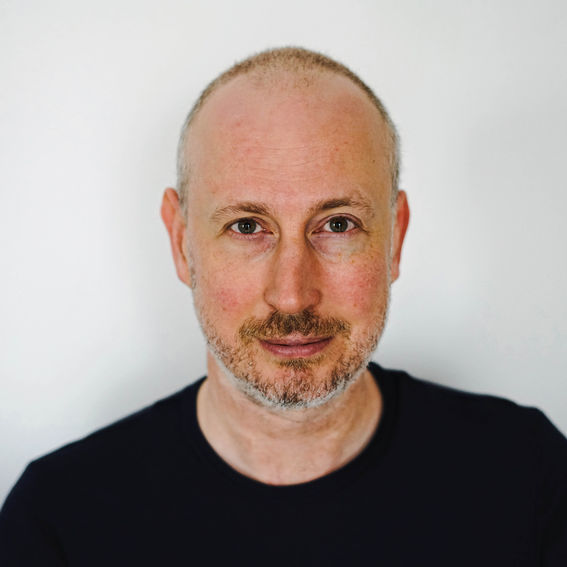
Benjamin Dillenburger (CH/DE)
Lecture title: Bits and Bricks - Towards a digital building culture
Bio: Benjamin Dillenburger is an architect who explores computational design methods and digital fabrication to broaden the design freedom for architecture and to develop performative and sustainable building solutions. Benjamin Dillenburger’s work was presented in events like the Venice Architecture Biennale, London Design Week, and Art Basel Miami. Recent work includes the design of two full-scale 3D printed rooms for the FRAC Centre Orleans and the permanent collection of Centre Pompidou Paris and the development of a lightweight concrete slab, as part of a housing project entirely fabricated with robots and 3D printers, the DFAB HOUSE. Benjamin Dillenburger holds a Ph.D. and a Master of Advanced Studies degree from the ETH Zurich, and is a Professor at the Institute of Technology in Architecture at the ETH Zurich, where he leads the research group Digital Building Technologies. He previously taught as Assistant Professor at the Faculty of Architecture at the University of Toronto. Currently, he is also Principal Investigator of the Swiss National Competence Centre of Research Digital Fabrication.
Lecture abstract: Information Technology has the potential to challenge traditional paradigms of construction: the digitalization of architecture opens up new routines from design to fabrication, and allows to redefine the role of architect and computer within the design process. The strategic combination of computational design and robotic manufacturing, such as large-format 3D printing, can pave the way towards a more sustainable and more diverse built environment – towards a new digital building culture.
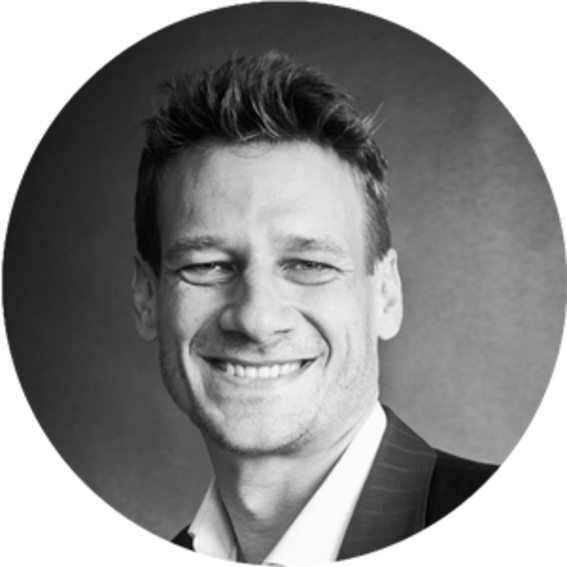
Martin Hanczyc (IT/USA)
Lecture title: Animation through Chemistry
Bio: Martin Hanczyc is an Associate Professor in the Department of Computational and Integrative Biology at the University of Trento, Italy and a Research Professor of Chemical and Biological Engineering at the University of New Mexico, Albuquerque USA. He formally was an Honorary Senior Lecturer at the Bartlett School of Architecture, University College London, Chief Chemist at ProtoLife and Associate Professor at the University of Southern Denmark. Hanczyc received a bachelor’s degree in biology from Pennsylvania State University, a doctorate in Genetics from Yale University and was a postdoctoral fellow under Jack Szostak at Harvard University. He has published in the area of droplets, complex systems, evolution and the origin of life. In 2014, Hanczyc established a laboratory for Artificial Biology as part of the Centre for Integrative Biology (CIBIO) at the University of Trento with a focus on integration of various functional aspects of artificial life, synthetic life, and natural life. His research projects are diverse and include: interfacial dynamics, modelling of complex chemistry, optimization strategies, robot-chemistry interfaces, fundamentals of intelligent materials, synthetic biology, and new materials for architecture and engineering. Additionally, he is known for collaborating with artists and architects in innovative projects and also to develop public outreach. Hanczyc’s work has been highlighted in an invited TED talk, several keynote lectures and many press items including Nature, New Scientist, BBC, WIRED and Scientific American.
Lecture abstract: My work is focused on understanding the fundamental principles of living and evolving systems through experimental science. To this end, I build synthetic systems that behave in part like natural living organisms. I will present experimental models of synthetic biology based on simple chemical droplets. This system has the ability to sense, metabolize, move and more?
Read more about Hanczyc's place on the WIRED Smart List for 2013.
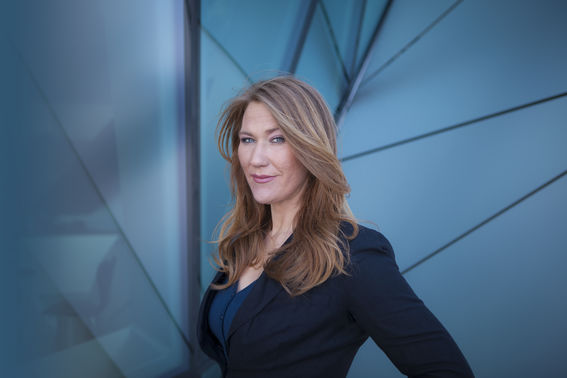
Elizabeth Jochum (DK / USA)
Lecture title: Decolonizing the Machine: Confronting Axes of Inequality in Robots and Al
Bio: Dr. Elizabeth Jochum (she/her), is an Associate Professor in the Research Laboratory for Art and Technology at Aalborg University in Denmark. Her research combines robotics and art, and includes transdisciplinary collaborations in human-robot interaction, health, and engineering. From industrial robots to exoskeletons, Jochum explores critical and creative approaches to arts, health and technology.
Lecture abstract: Enthusiasm for robots and AI abounds, but headlines repeatedly warn of the very real harm caused by biased algorithms that discriminate on the basis of race, gender, disability, and other axes of inequality. From intelligent voice assistants to sex robots, we live in a world that has been shaped by what the feminist social theorist bell hooks describes as the “white supremacist capitalist patriarchy.” This system is being swiftly reproduced in digital systems that replicate these harms through digital redlining and other dehumanizing exclusions. This talk considers the historical linkages between race, technology, culture, and the machine as cultural formations that continue to uphold neoliberal forms of power and Western conceptions of the human. Only by teasing out these social and political dimensions can we begin to work imaginatively and diligently to disrupt and transform the colonial legacies encoded into machines.
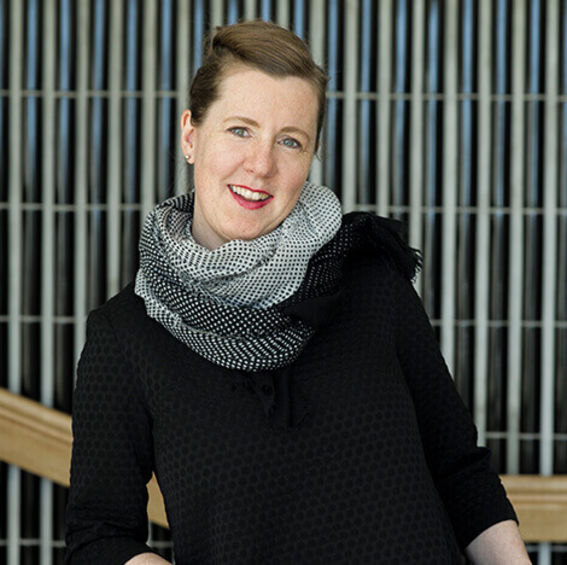
Pia Fricker (FI/DE) (moderator)
Bio: Pia Fricker serves as Professor of Practice and Vice Head of the Department of Architecture at Aalto University, School of Art, Design and Architecture in Finland. She holds the Professorship for Computational Methodologies in Landscape Architecture and Urbanism, directs the interdisciplinary Urban Studies and Planning Programme at the Department of Architecture and is member of the Aalto University Experience Platform. Pia Fricker’s research and teaching link urban design and landscape architecture to the field of digital design culture through the lens of emerging technologies.
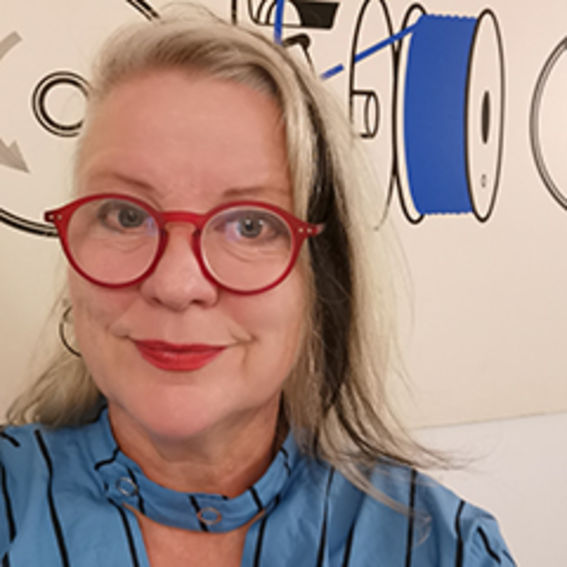
Laura Beloff (FI) (moderator)
Bio: Laura Beloff (Ph.D.) is an internationally acclaimed artist and researcher in the cross-section of art, technology and science. Additionally, to research articles and book-chapters, the outcome of the research is in the form of experimental art projects that deal with the merger of the technological and biological matter at large. The research engages with areas like human enhancement, biosemiotics, biological matter, artificial life, artificial intelligence, robotics, and information technology in connection to art, humans, environment and society. She has Doctorate of Philosophy from Plymouth University. Previously she was Full Professor at the Art Academy in Oslo 2002-06, a visiting Professor at The University of Applied Arts in Vienna 2009, 2011. During 2012-2019 she was Associate Professor, Head of Section 2012-2016 and Head of the Doctoral School 2017-2019 at IT-University in Copenhagen. Beloff has been the Head of ViCCA-program (Visual Cultures, Curating and Contemporary Art) during 2020-2022 at Aalto University, Finland. Currently, she is Associate Professor and Head of Doctoral Education in the Department of Art & Media (DAM) at Aalto.
Aalto University joined the list of LASER Talks hosts in 2020. The aim is to organise 2-4 LASER Talks every year at Aalto. If you are interested in giving a LASER Talk at Aalto, please send an abstract to laura.beloff@aalto.fi.
LASER Talks series at Aalto University 2022 is organised by:
The mission of LASER is to encourage contribution to the cultural environment of a region by fostering interdisciplinary dialogue and opportunities for community building to over 40 cities worldwide.

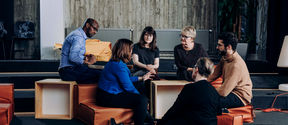
Aalto Networking Platform -yhteistyöalusta tuo tutkimusosaamista yhteen yli laitosrajojen.